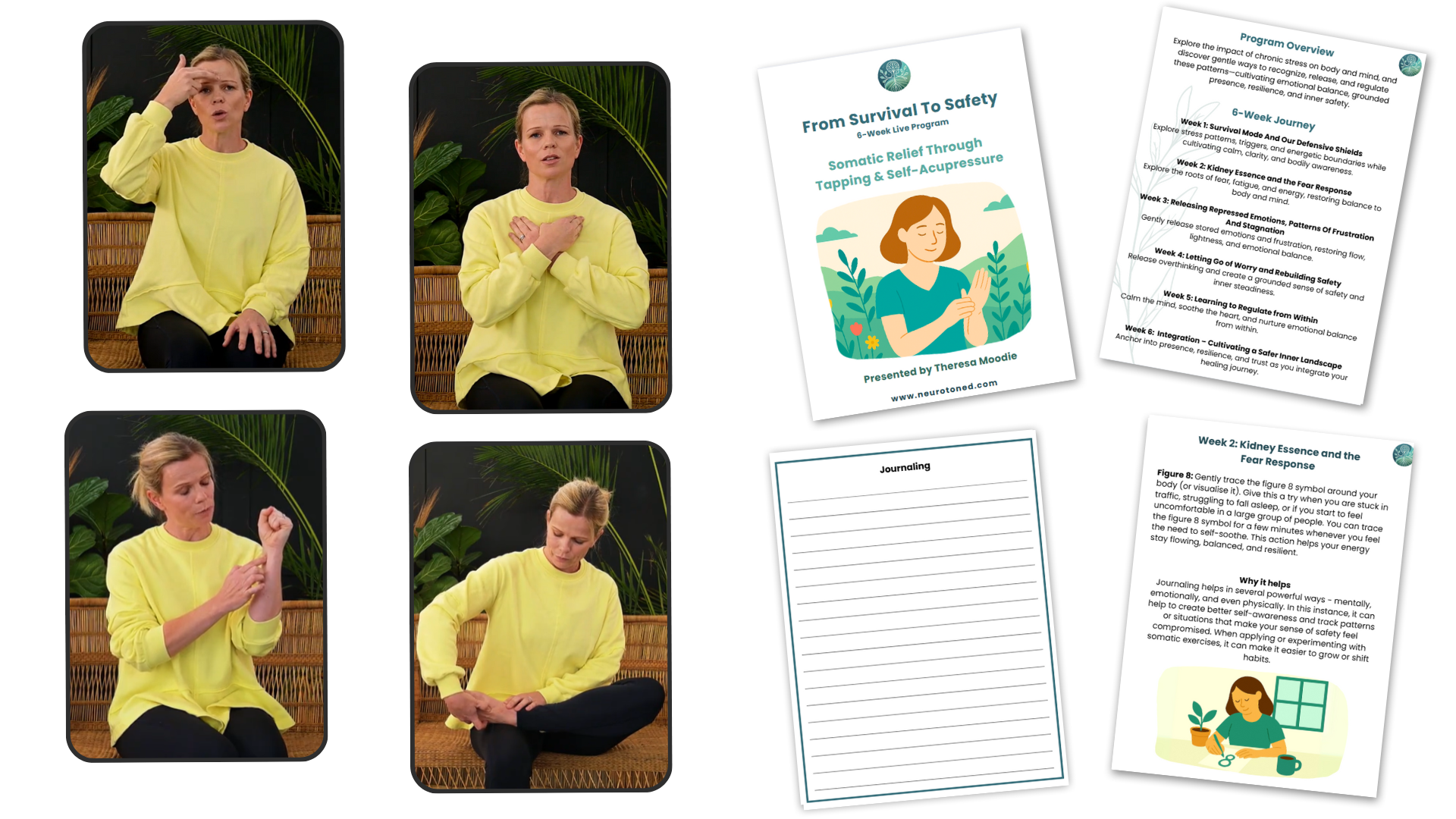
A Calm Nervous System Support Plan for Perimenopause Anxiety
A gentle note before we begin
If you are moving through perimenopause and noticing fear spikes, jitteriness, or waves of anxiety that come out of nowhere, this is more common than people talk about. Hormonal shifts can make the nervous system more sensitive. You may feel wired, fragile, overstimulated, or unlike yourself.
Before we go deeper, here is something simple and supportive.
You can take the Stress Loop Quiz. It may help you understand which stress pattern your body returns to most often.
You are not failing. Your body is trying to find its footing.
Featured Answer
Perimenopause anxiety often rises because hormone changes lower stress tolerance and make the nervous system more reactive. A supportive plan focuses on steadying your physiology, widening your window of tolerance, nourishing consistently, and adding small practices that help your system feel safer. Slow exhales, somatic grounding, warm compresses, gentle focus anchors, and stable daily rhythms can help your anxiety soften over time. Small steps are enough.
Why anxiety increases during perimenopause
When estrogen and progesterone shift, the nervous system becomes quicker to activate and slower to settle. This can lead to:
- Sudden dread or fear
- Racing thoughts
- Feeling like your body is buzzing
- Irritability that surprises you
- Trouble sleeping
- Emotional waves that feel disproportionate
If you have any history of chronic stress or trauma, these changes can echo old alarm patterns. Many people feel like they are suddenly back in their past body states. If that describes you, this explanation of why you may feel ready to jump out of your skin for no clear reason can offer some grounding context.
None of this means your body is broken. It means it is overwhelmed.
A Nervous System Support Plan for Perimenopause Anxiety
Below is a gentle plan. Nothing intense. Nothing that asks your body to push. We focus on steadiness, safety, and widening your capacity.
1. Start your mornings with predictability
Mornings can feel like the hardest part of the day. A simple ritual can help you orient to safety before the day carries you.
You can try:
- Sit upright with your back supported
- Place one hand on your chest and one on your belly
- Let your exhale last one or two seconds longer than your inhale
- Hum softly on the exhale for 20 to 30 seconds
If you want a more structured option, you might like this nervous system morning reset that many readers find grounding.
2. Notice your stress window
Perimenopause can shrink your window of tolerance. You may get overwhelmed faster, or shut down more easily.
Learning how to recognize and gently expand this window helps you feel safer in your own body. This gentle guide explains the idea simply and offers tiny steps you can try.
This is not about pushing yourself. It is about building a little more room to breathe.
3. Support your body with steady nourishment
Blood sugar swings can mimic anxiety. Perimenopause makes these swings more noticeable.
Simple shifts can help:
- Eat within an hour of waking if possible
- Add protein and healthy fats to each meal
- Avoid long stretches without food
- Drink water through the morning
If you want clearer guidance on meals, this resource on meals that help your nervous system feel safe may help. You may also want to read this piece on why hydration helps regulate the nervous system.
4. Build in pressure-release moments
Your system may hold tension more tightly now. Small somatic breaks can keep the buildup from overwhelming you.
Try:
- Pressing your feet gently into the ground for 5 seconds
- Letting your shoulders drop as you exhale
- Using a warm compress on your chest
- Pausing to look around the room and notice three colors
If grounding feels strange or difficult, this gentle guide on grounding during panic may help you find options that work even when you are overwhelmed.
5. Respond kindly when physical symptoms spike
Many people notice racing thoughts, heart flutters, or stomach tension during perimenopause. These can be scary, especially when they arrive suddenly. This overview of why panic sensations happen may help you understand your body’s signals.
And if you struggle with sensations that make deep breathing feel worse, this piece explains why that can happen and what to do instead.
Your body is communicating, not attacking you.
6. Build familiarity with safety
When your system is on alert, feeling safe can seem out of reach. Trauma-informed care explains this pattern clearly and kindly.
You are allowed to need more gentleness right now.
A Gentle 14-Day Support Plan
Week 1
Day 1: Slow morning hum
Day 2: Two grounding breaks with feet presses
Day 3: Add a protein-rich snack
Day 4: Warm chest compress before bed
Day 5: Simple outdoor walk for 5 to 10 minutes
Day 6: Softening your shoulders as you exhale
Day 7: A minute of orienting to the colors in the room
Week 2
Day 8: Name one emotion without fixing it
Day 9: Drink water before noon
Day 10: Stretch your upper back for 30 seconds
Day 11: Eat something grounding like oats or hummus
Day 12: Five-minute room reset to reduce sensory load
Day 13: Gentle humming or vagus nerve breathing
Day 14: Retake the Stress Loop Quiz to notice shifts
Common sticking points
“I feel like I am losing myself.”
This season is a major transition. Your sense of self may feel softer. This does not mean you are disappearing. Your nervous system is adapting.
“The anxiety hits without warning.”
It often does during hormonal changes. Our work here is not erasing shocks, but helping your body return to steadiness faster.
“Grounding feels useless when I am overwhelmed.”
Grounding works best when you practice it during medium stress. Practice small tools on easier days.
“My physical symptoms scare me.”
Many sensations come from stress. If something concerns you, consider speaking with a healthcare professional for clarity and support.
More Gentle Reads
These may feel soothing, especially in this season:
- A simple explanation of the gut-brain connection.
- A gentle guide to stopping adrenaline spikes naturally.
- A soft, steady 10-minute nervous system reset for overwhelm.
Disclaimer: This article is educational and not medical advice. If you have health concerns, consider speaking with a qualified professional.
Discover Your Vagal Tone
Find out how dysregulated your nervous system is and get your personalized roadmap to feeling calm, energized, and in control


